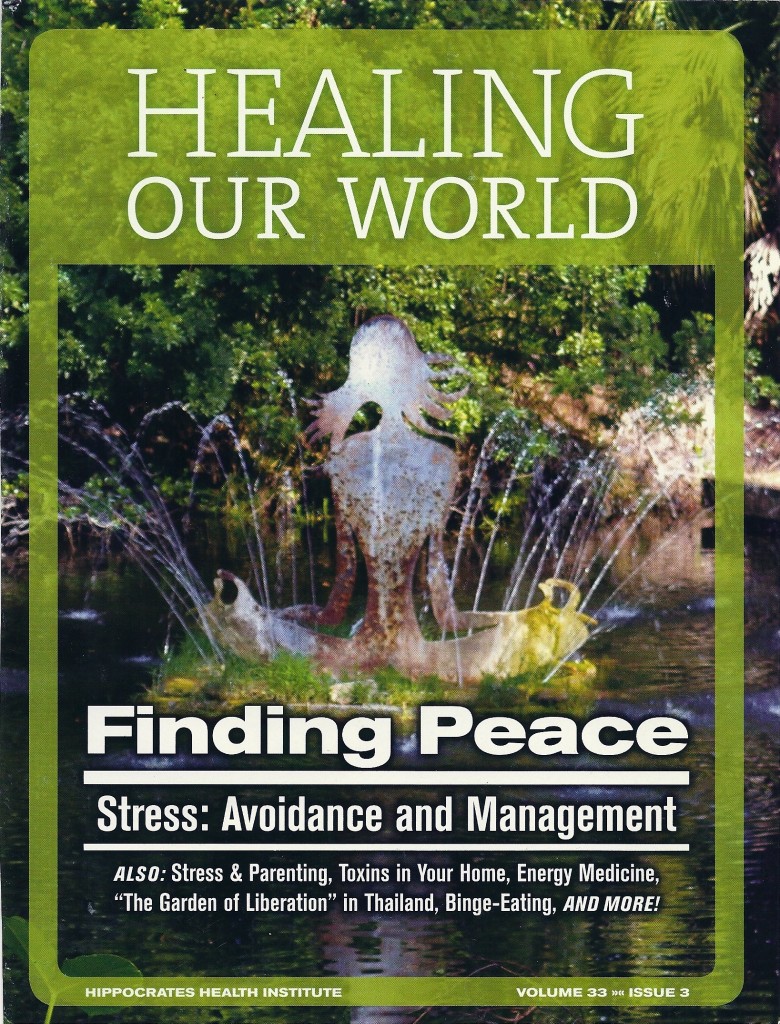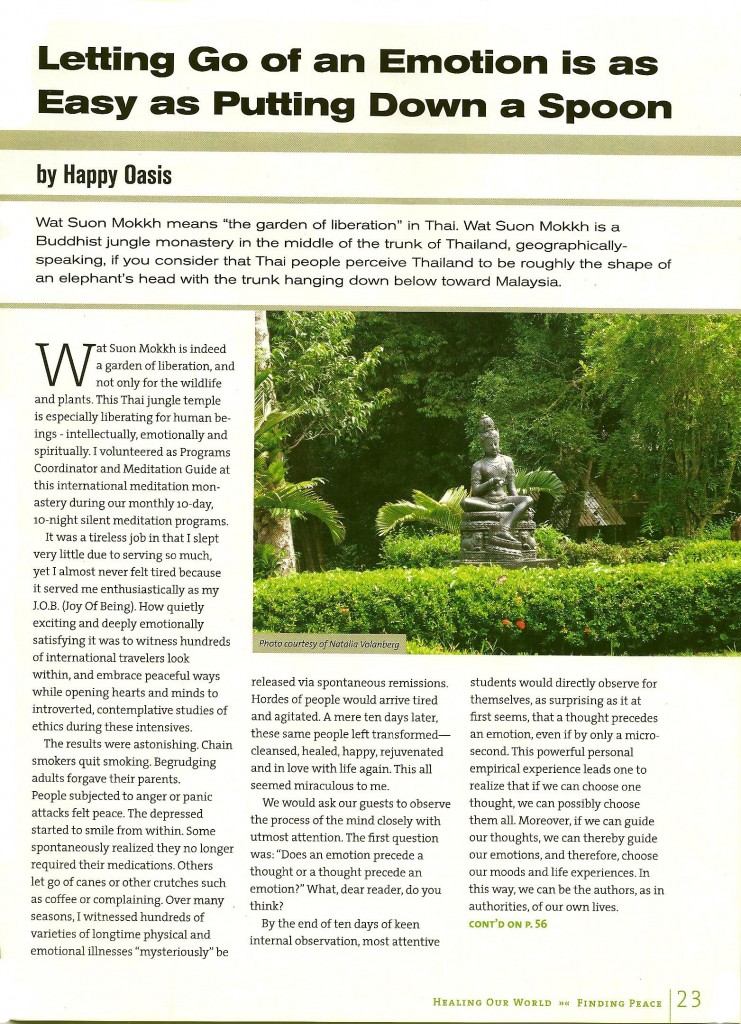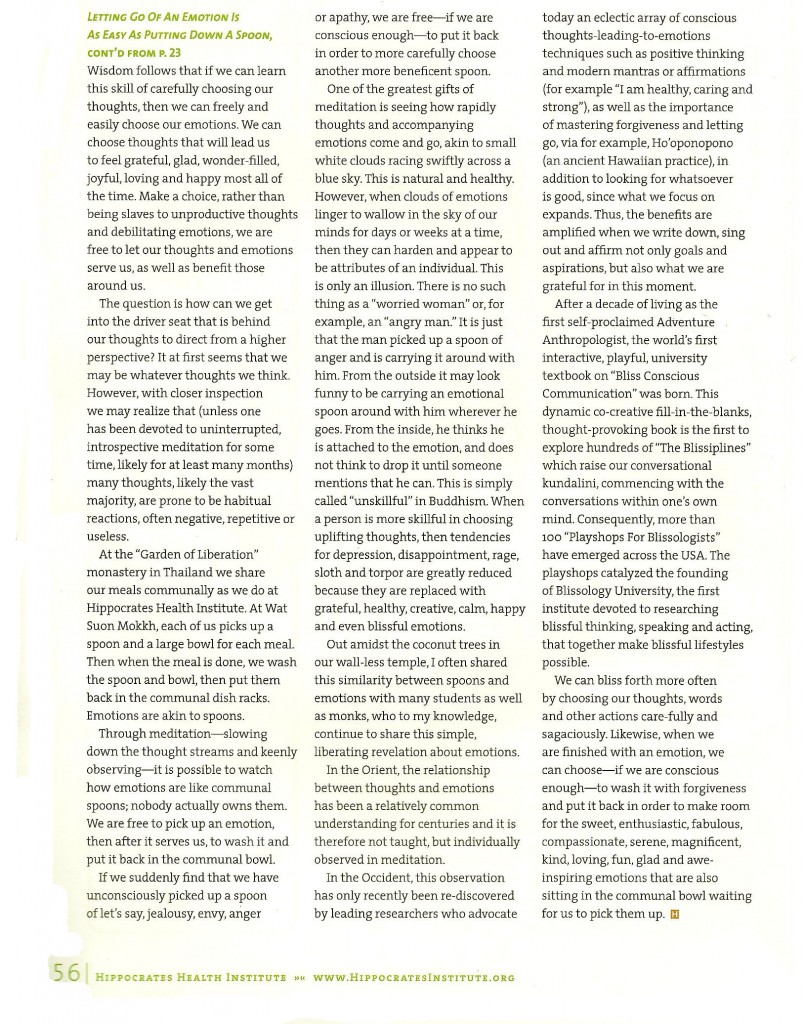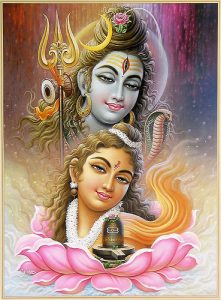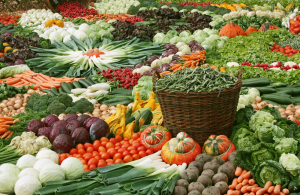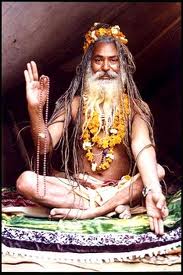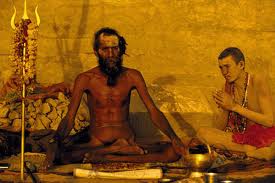News Articles
Click Here to download your free copy of Happy Oasis’s article for Hippocrates Health Institute’s quarterly journal “Letting Go of Emotion is as Easy as Putting Down a Spoon” here! While awaiting the large file to download, please scroll down to enjoy more outrageous articles such as “Why Smoking a Cigar Could be Good For You” and “Making Love in a Laundromat”. 🙂
November 2, 2013
Why Smoking Cigars Could Be Good For Us (And The Importance Of Embracing It All) by Happy Oasis
For some of us on with a lifelong pursuit for health, our relationship with raw vegan foods may be compared to our relationship with our mother. When we first re-unite with our mother (raw foods), those first few infantile months or years can be pure bliss. Our cells feel nurtured as never before as we are embraced by what may be a physiological remembrance of longlost primordial energy, strength and intuitive intelligence from some form of “the original diet” prior to the advent of cooked food. In this article, we refer to cooked food as “our father”.
During the first few years of fully reuniting with this ancient raw diet, we may feel the love, comfort and devotion that an infant feels toward its mother, seeing her perfection – that is, until we go to school about 3 to 6 years later, and start to question, seeing that there are other mothers, fathers, teachers and children too, each offering a unique perspective.
Later on, as more years pass, some pre-teens and young teens, especially in North America, feel an urge to rebel against their (raw) mother and align with their (cooked) father, as if in their not-yet-fully-mature-black-and-white perspective, only the mother (raw foods) or the father (cooked foods) could possibly be right, without yet considering how perchance both perspectives can be simultaneously embraced.
Not that all (raw) mothers and (cooked) fathers are wise. Life shows us that many are not wise in all ways all the time, but that those mothers and fathers who have had a tendency to earnestly seek out truth since youth tend to be able to share more balanced perspectives with us due to decades of continuous scientific observations and corresponding philosophical insights, otherwise known as wisdom, in their later years.
This is why, as a life long seeker of wisdom myself, it was raw vegan elders who I invited to speak at the Raw Spirit Festivals, serious life long researchers, raw grandmothers and grandfathers, who had been on a healthy living path for decades. For the most part, I resisted the temptation to invite on to the stage the burgeoning plethora of new young enthusiasts (of all ages), no matter how fun, hip, healthy, good-looking and popular young raw enthusiasts can be.
Why not go for whose popular? Because cigarettes are humanity’s most popular past time, McDonald’s is the world’s most popular restaurant, and Coca Cola is still the most popular beverage (among humans) on Earth. Thus, popular does not equal wise or true. Forgive me for preaching to the choir by stating the obvious: wisdom and truth have nothing to do with getting the most votes thereby winning a popularity award. Knowing this, Raw Spirit Fest has never issued any raw awards based on popularity contests because our infantile perception (newly raw) about our mother (a fresh dietary regime) is going to differ substantially from what we as raw teenagers or seasoned raw adults (those 18+ years researching a raw-friendly diet) would share about that same (raw) mother.
Back in 2004 and 2005, during those first two years when I was the emcee of the first sprouting Raw Spirit Fests, knowing full well myself to be somewhere between an infant and a teenager in my relationship with raw, then 9-years on an energetically-resplendent raw vegan regime, I asked my raw elders from the main stage which percentage of vibrant vegan cuisine they were generally eating after so many decades along this vibrant path, as my attempt to moderate any extremism afoot in the audience. Apparently not everyone was listening.
It was revelatory. Researcher Brigitte Mars said something like 80%, Viktoras Kulvinskas said between 70% and 90%, Dr. Jameth Sheridan said 70% to 80%, and Dr. Gabriel Cousens said that he enjoyed about 99% organic raw vegan himself, though his program at the Tree Of Life encourages people to eat 70% – 90% raw vegan when they go home as a longterm sustainable suggestion. Sustainability is key. These days, my beloved and I enjoy eating whatever we are organically drawn to which somehow so happens to magically work out to include about 75% – 99% vibrant eclectic fresh (raw) vegan cuisine. The longterm results after about 15 years? We feel energized, healthful, peaceful, grateful, flexible, giggle-ready, gleefully glad to be alive and enthused about our ceaselessly pleasantly adventurous lifestyle which joyously includes marvelous YOU. Thank you.
Interestingly, those original longtime Raw Spirit elders remain stable in and are sustainably steadfast today in their perception that 99% or even 100% raw may be a wonderful cleansing or health-boosting diet to aid in overcoming serious diseases such as diabetes or cancer, temporarily for bringing one’s health to the next level. Temporarily is the key. For some it is a day, for others it may be a lifetime. Yes, I agree. That is quite a range. After all, a happy cow needs a large range.
Nearly a decade has passed since the first Raw Spirit Fest, yet these raw elders still stand true, seeing the wisdom of listening to intuitive calls to eat whatever is of the wisest in the moment, for many it means more diversity with a daily foundation that still features sumptuous portions of organic raw vegan foods and juices.
Why am I mentioning this? Be forewarned: there is today a shocking wave of ardent once-raw vegan leaders speaking condemning, as if from the pulpit, amen, what they now deem to be devilish raw vegetables and dastardly fresh fruits. Keep in mind, these are the same folks who soon after discovering the power of raw foods, wrote and spoke fervently about how everyone should be totally raw all the time. Or else. I kid you not that more than a dozen once-raw vegan authors are now thusly rebelling. Individually yet together. En masse. Precisely as some (12+ years raw) teenagers tend to do.
This plethora of raw “teenage” leaders who had personally poopoo-ed anyone who did not eat 100% raw are now doing a 180 degree shift after more than a decade on raw. A surprising surge of anti-raw book titles by these furious folks have come out such as the Anti-Raw Diet, etc. No, to our knowledge they have not been hired by the AMA or Monsanto, but they may as well have.
Moreover, Youtubes about Why Raw Foods Are Bad For You, etc, are now suddenly rampant, apparently without consideration that these reactionary reports may be sadly diverting people from seeking simple cleansing foods that they may need. People with compromised health who could seriously benefit from adding more simple organic raw vegan fare into the typical SAD junk food diet are being led to believe that eating anything raw will destroy their health.
Internal shifts of perspective – intuitive wake up calls – are natural, yet that these folks are entirely denouncing raw is unfortunately just as extreme and unbalanced as their erstwhile fanatical approach of ostracizing anyone who momentarily contemplated even a crumb of cooked food.
Could it be that these raw leaders’ daily choices in their own daily raw diets was perchance not sufficiently balanced enough to sustain them over the long haul? I interviewed many of the folks who are apparently part of today’s “anti-raw” movement. They seem to share something in common: they generally dislike eating dark leafy greens, some of them to a point of loathing. Therefore, over the years, they became depleted of the essential minerals and other nutrients absorbed by eating daily salads as well as mono-foods such as ho-hum celery sticks, old-fashioned carrots sticks, straightforward cucumbers, non-nonsense cabbage and daily sprouts.
To overcome this distaste for greens and vegetables, some tried new things that are not necessarily natural to the body, such as drinking smoothies as their only source of leafy greens, substituting greens for a diet of primarily raw chocolate (with all of its associated sugars and concentrated fats) as their main caloric source of energy, or eating fruits as a staple until their teeth secretly fell out, a symptom of serious systemic imbalance.
There are countless fruitarians who wear dentures, including many famous leaders who are still on the speaking circuit. (In case you’re wondering, my teeth are still healthy and real). In all these cases, these folks put pleasure, tempting complex raw gourmet dishes, their sweet tooth, and other poor yet popular dietary habits above wisdom and self-discipline. Self-discipline is self-blissipline in the long run.
Eating a dark leafy green salad with avocado and a variety of vegetables may seem boring to some, but greens are deeply sustaining, easy to prepare, accessible, and non-damaging for most everyone (very few exceptions) who is earnestly interested in longterm health.
Are these raw “teenagers” (some of those who have been raw for 12 to 20 years) missing some deeper lessons? Is it really true that all raw organic fare is suddenly “bad”? Isn’t kale still just kale? Why blame broccoli? Because broccoli cannot readily defend itself? Could these folks have not been on the most balanced versions of a raw diet, which perhaps somewhat explain why they are bouncing? Could they take responsibility for that possibility? Or is it easier to save face and report that “raw is bad” the way that teens deem that their mothers seem “bad” when mothers embarrass or contradict teenagers.
But then we eventually grow up and become mothers ourselves, one way or another.
Not many people know what “Raw Spirit” originally meant to me since noone has ever asked. Having moved back to the USA – a new foreign country to me after so many years abroad – I soon realized that I found myself somehow surrounded by thousands of emotionally-charged, often imbalanced, yet mostly well-meaning raw vegan enthusiasts, many of whom could be deemed fanatics.
So, what did the term ‘Raw Spirit’ mean to me?” In Asia, the monks and nuns I lived with at Buddhist forest monasteries and Hindu temples were spiritually, intellectually, and emotionally deeply mature and ethical too; yet, many of them were falling physically ill and sluggish from eating daily breakfasts of fried rice, tofu, and cooked vegetables.
Realizing that despite my efforts, raw vegan options were too counter-culture to be widely accepted at these traditional Asian jungle monasteries, I dreamt of bringing “Raw” and “Spirit” together elsewhere so that these monastic friends and everyone who could benefit around the world would be healthy in all ways ~ both in Spirit and in Body. These ascetic, hermetic friends were so spiritually-focused that they were certain that if only we meditate, chant, study wise scripture, serve and pray more, we may overcome all ills; that it matters far more what goes out of our mouths than what goes in, and that by developing spiritual powers, we can transmute all foods into pure, harmless and nourishing substance.
This is all true to a great degree, though not entirely all the time. These kind, gentle, earnest, honest, innocent souls embrace a far wiser and kinder approach to living than a lot of us Americans can imagine possible. However, despite developing Shiva powers (which do indeed allow us to internally transmute toxins into health-giving foods), it seemed needlessly inefficient to have to spend so much energy on transmuting fried food toxins into something more digestible and easily energetically-usable by our body temples. Hence “Raw” and “Spirit”, “Raw Spirit” being the wedding of deep spiritual practices with fresh, health-and-energy-enhancing food. As you can now see, unbeknownst to me at the time, this meaning of “Raw Spirit” was destined to be wholly understood by only a very very few Orientals and Occidentals.
After many many years of living in the Orient among monks, nuns, sadhus and adventurers, little did I know upon my return that “Raw Spirit” would mean something entirely different to many of the participating Americans to whom “Raw Spirit” meant something akin to”worshipping raw foods” or “praising the spiritual powers that come from eating raw foods”. To those peering in from the outside, they might have errantly believed that we were worshipping the spirit of a kale leaf.
Thus, before my bewildered eyes, even though we offered meditation, yoga, chanting and peace programs at the Raw Spirit Festivals, the events soon became far more focused on food than I had ever envisioned. Regardless of my directing the focus onto an eclectic array of ethics and corresponding spiritual Blissiplines, Raw Spirit Festivals grew into sensual gourmet food-lovers’ frenzies, and I, still happy to eat three daily simple 10-minute meals of salad or juice, was rather perplexed at why this was happening. It was a question of cultural dyslexia.
Rather than an opportunity for gourmet indulgence, for me Raw Spirit Festivals were serious gatherings created to save lives, helping people improve their health and happiness while overcoming the rampant materialism and then-isolation of going it alone via fresh foods. Due to a nationwide giddiness with the unprecedented material wealth in the then-burgeoning American economy, whenever I would return to the USA, it was apparent that spiritual practices such as meditation, prayer, ecstatic poetry and inspirational music were being overlooked in exchange for shopping and accumulating.
After decades of compromised health on a childhood Standard American Diet, a simple raw vegan diet is what saved my life. My aim was to help save others the pain, fear and cost of needless hospitalization and pre-mature dying from so many self-caused, lifestyle and diet-related diseases.
Some of the once-raw enthusiasts who have recently gone 180 degrees against raw vegan fare all together, confided that they felt themselves to be secretly somehow superior when raw (for what? putting something in their mouths?) Thus, there is an emotional component with associated quiet guilt or shame for judging others for eating exactly what they are now eating today.
What are these folks now eating if there is little or nothing raw vegan in it? Fried steak? Eating large quantities of meat may be temporarily helpful for those who depleted their systems via a longterm fruitarian or raw chocolate or gourmet or other imbalanced version of a raw diet, but any diet without at least some fresh greens is not optimally sustainable for more than a while. Inuits are said to have had short life spans. Moreover, participating in factory farm practices of today is decidedly unsavory for those who entertain even a modicum of ethically consideration and health consciousness. Viva la liberdad!
On the other hand, (we have five fingers) as you likely realized yourself years ago, eating meat has been a long time portion of most of humanity’s diet since time immemorial, if even only very occasionally, whereas dairy, and especially grains, are relative new comers in the last few thousand or hundred years, geography depending. This is one reason why grains and dairy, with their variable degrees of digestibility and absorption, do not feature prominently in the long run in most raw diets.
Why is it that human beings are the only animals that spend a large portion of their energy on overcoming self-caused illness and have to read books about what to eat and what not to eat? This leads one to recall these words of wisdom:
“Only two things are infinite, the universe and human stupidity,
and I’m not sure about the former.”
– Albert Einstein
Which brings a funny story to mind. A certain well-known, lovable, perennial character once shouted from the Raw Spirit Main Stage to my horror and amusement at the absurdity, “Don’t pay your rent! Don’t pay your mortgage! Buy chocolate instead! You can live anywhere, but you need to eat, and you need to eat chocolate today!”
Shortly after that speaker declared such obvious rediculousness, a participant came up to me complaining, “I can’t afford both the rent and the chocolate. What should I do?” I thought she was joking and I responded quickly in the middle of walking briskly to my next meeting, “What is more important?” With just a moment’s hesitation, she walked over to the speakers’ booth and bought chocolate.
“Who is the greater fool, the fool or the one who follows a fool?”
– Obe Wan Kenobi
As some of you have heard me say over the years, it was interesting to personally observe back in 1998 that, at least in Alaska where I was living in the coastal wilderness, the Grizzly Bears with whom I lived only mated after the salmon runs started fishing (and eating fish). Moreover, having lived with traditional vegetarian Hindus, I was at first surprised in the 1980s to learn that these longtime vegetarians eat meat every autumn on Rama Sita night, the prescribed ritual religious night of love making. Around the world, vegetarian women who are in touch with their bodies often find themselves craving meat during their pregnancies, and if they are wise, they eat it, since they are producing a baby made physically of meat. Yes, my friends, we mysteriously come from meat. I have never been pregnant so cannot personally testify to this craving and seem to personally excel on copious vegetables with modest fruits.
So, I am not necessarily advocating that you go out and buy buy a barbecue! I have not, but who am I to say? However, I am advocating, as always with vivid examples, to forego extremism and, if it is time, to take up again that illuminating, most fascinating, lifelong search within.
It seems that a more important question than raw or not raw or how much raw is this important self-directed question: What is the root of extremism? A delicate blend of foolishness requires a lack of sufficient well-rounded information that takes years to absorb coupled with (sometimes hidden) arrogance that itself may be rooted in a lack of self-confidence. Some say a lack of self-confidence can be overcome by simply thinking of other things than oneself. The greater the curiosity with the world, the more the asking of questions about it all, the less one is left with potentially self-sabotaging self-absorption.
This brings us to the point of this article’s title: “Why Smoking Cigars May Be Good For You”. Even though it was not evident to myself, I was aware as a spiritual aspirant, that I might be blindly arrogant or could become arrogant, thus partly blind, due to certain longtime disciplinary habits of living primarily as a hermetic ascetic and monastic, which many deem to be extreme. For example, I all together missed out on the drunkenness and carousing that people in their young twenties generally did at universities, because by the age of 19, I had moved to Asia as an Adventure Anthropologist who was primarily adventuring in the wilderness alone or with tribal natives between abiding at Buddhist monasteries and Hindu ashrams.
So, after many years abroad in such pristine circumstances, returning to the USA in my late twenties, I decided to take up this at first apparently-absurd, annual, self-disciplinary ritual to help overcome potential parochial vision, health extremism, and arrogance hidden even to myself:
Once a year, like it or not, I would buy the two cheapest packs of cigarettes and cigars I could find, then head into a the nearest bar with $20 (now worth $50) to buy myself and my barstool neighbors drinks, while sharing stories and bar culture until I felt sufficiently tipsy, tired and bar-full.
It is a fascinating Blissipline to investigative life by frequently experimenting with oneself in diverse circumstances. However, what gives us the authority to include others in our experiments, as if we are world authorities just because at our particular age in this particular season at this particular place in our particular life form we are eating or not eating something that seems to make us feel good?
When I was persistently 99% – 100% raw vegan during seven years to overcome life-threatening diseases and thereby save my life (it evidently worked), a young woman approached my mother at one of the huge Raw Spirit Festivals in Sedona.
“Being the mother of Happy Oasis, you must be a raw vegan too! I’m so glad to meet you!”, the young woman gleefully exclaimed, while hugging my mother with enthusiasm.
“Not exactly,”, my mother diplomatically responded.
The young woman looked momentarily sad and confused, then asked my mother, “Then you must be vegan?”
“Not exactly”, said my mother, slightly blushing.
The young woman persisted. “Then you are a vegetarian, right?”
“Not exactly”, said my mother smiling a little awkwardly.
“Then you are into health foods?” “Not quite”, confessed my mother, honestly.
The young woman walked away and later came up to me to let me know what a failure I was that my own parents had not “gone raw”.
I told the young lass that, “It’s not up to me to convince anyone to do anything. I am simply wishing to share information with those who wish to hear it, who are interested in living their own unique version of a healthy lifestyle and in preventing disease. This information is only interesting to a small percentage of people. My parents are their own people and are free to do as they like.”
I invite you to keep experimenting if you like, or not if you are already feeling fabulosa, to be your own doctor, to be your own authority, your very own in-house sage, scientist and philosopher, yet not to be someone else’s, but instead to encourage others to do the research on their own body-mind-heart-temple as you have on yours. As you well know, we can only ultimately do this for ourselves since our research may or may not ultimately apply to others.
Heraclitus said, “Those who have not become their own doctors by the age of 40 are fools.” There are many areas of foolishness and wisdom to enjoy beyond health, since life can be so complex, especially today. May you enjoy your discoveries with equilibrium and equipoise, compassionate inclusiveness and a beefy main course of humor.
My own extensive studies show that the ability to lighten up and laugh at oneself may be even healthier than eating oodles of fresh, organic, dark leafy greens. Besides, if we don’t eat our greens, we can always smoke them. May I offer you a cigar? It’s on me.
October 26, 2012
How We Are Co-Creating The World’s Most Beautiful Beggars by Happy Oasis
At the sold-out Sacramento Bliss Conscious Communication Playshop recently, a budding Blissologist told our group that beggars really bother her, said she cannot relate to them, and asked, “What can we do about this”?
Few will deny that beggars are abounding. In fact, beggary may be the fastest growing profession in the USA today. How can beggars positively contribute to the emerging ecstatic economy? Read on to discover how.
Having abided in third world countries for nearly a decade, I grew accustomed to the omnipresence of beggars. In India, I observed myriad anomalies, yet generally three kinds of beggars, namely 1. spiritual sadhus, 2. deformed performers, and 3. those who are down and out temporarily or permanently such as single mothers with young children, the mentally ill, and the elderly.
Important Observation: within two generations the majority of this new, rising phenomenon of widespread American beggars have the option to ascend into the first type of mystic beggars who bless, amuse and offer inspiration to passerby’s or to descend into the abysmal practice of cutting off limbs of their children or otherwise graphically mutilating their family members, including themselves, for the purpose of evoking monetary pittances from unsuspecting, compassionate passerbyers.
I have seen this first hand in many third world nations. Now that you know this great potential for tragedy or sagacity, it is ALL OF OUR response-abiilty to inspire and train the up-and-coming growing class of beggars. This includes YOU by response-ably educating beggars or begging response-ably yourself wherever you go in every conversation in which beggars come up. Instead of apathetically, fearfully, disgustedly or annoyingly passing by a beggar, it is our joyous duty to inspire beggars to inspire others.
For example, I told a young, strong-looking 20-something years young beggar that if he could say something inspiring ~ anything at all ~ I would give him a dollar.He said he could not think of anything positive to say. I told him I would come back with the dollar the next day. Upon seeing him in the morning, he beamed. “Good Morning, Happy! Isn’t it a beautiful day?” A dollar was dropped in his bowl. He beamed.
We all know professional women (and men) who would donate an offering to a beggar to compliment and/or inspire them as they enter their office building in the morning. How many people could benefit from hearing a compliment when walking down the sidewalk? Why stop at compliments? What about jokes? Poems? Prayers? Blessings? Philosophical Inspirations?
Moreover, the most stirring lines of classical and spiritual literature can be joyfully shouted out to someone walking by.
With persistent uplifting encouragement and suggestions from everyone of us, America’s beggars can be esteemed, valuable members of society as some of the greatest poets, mystics, comedians, friends and sages of this century, just as many beggars are in India today, a spiritual tradition that has endured there for millenia.
Think of the influence beggars could make by uttering a profound phrase from Thoreau or Hafiz or Swami Beyondananda before someone enters a courthouse. The simple act of instilling a slice of wisdom or joy into a judge, lawyer, prosecutor or defendant entering the court house could make an impact in legal decisions and consequently, lives.
Revealing it is that the root of the verb “beg” orginated from the Latin “bede” and means “to pray”. The word bead also comes from “bede”. What is the correlation of begging, praying and beads? They were considere the same activity. Today in India, millennium or two later, beggars are still the ones who pray for everyone in their midst while wearing and rubbing beads while begging. Today is an opportune day for us to re-ignite the tradition of such holy men and women in America.
Beggars are often the ones with the most time on their hands with their ears to the ground. Why not train them to lovingly let the rest of us know what’s happening in the world? “Be sure to wear your coat tomorrow, Sir. The forecast is snow.”
Have you considered giving a literate book-loving beggar one of your favorite books to read aloud to you or others next time you walk by? Most beggars are in need of friends, family and income-earning ideas. We can let them know that by reciting inspirational or humorous lines that their pay will likely increase. In addition, they will benefit the world, make new friends, inspire old ‘customers’, elicit smiles, catalyze conversations and giggles, and meanwhile feel happier about themselves as valuable contributors to society.
We need not beg to be able to bless and bliss everyone we meet. Sharing little kindnesses is the basis of the emerging ecstatic economy. How we speak to each other will soon become more important than almost any other aspect of living.
Why are the poor of Africa and Asia considered to be among the happiest people on the planet? Because, despite circumstances, they cannot afford anything but to live in a continuous state of joyful, love, humor and kindness. I have lived among the “poorest” and the happiest. They treat each other as if they are in the presence of royalty, because they are. We are. Every one of us.
Realizing all this, Blissology University, Bliss U is in its founding state. One branch of it will soon offer a free course regarding “How To Be A Beautiful Beggar”, including, most importantly, how the rest of us inspire beggars.
What does beggary have to do with the Raw Spirit Community News? This is the Community News after all. At our most recent Bliss Shop, a dynamic conversation broke out about beggars. Some said they never give to beggars. Some said they always give, which is wonderful, if it is possible.
I pointed out that in India before approaching a prominent temple, there can be a line of 1000 beggars. One could spend all day every day just giving to beggars, and then join them (!), due to consequently being completely penniless oneself. The massive numbers of beggars in India teaches us to be intuitive. Who really really needs these rupees the most? Not from egoic judgement, and outside appearances, but coming from an deep place of spiritual insight. This inspires us to spontaneously connect with source.
In this way, the presence of beggars can teach us to be present, to go within, to get in touch with our mystical wisdom so that we can respond originally in each moment rather than reacting or following a prescribed system of “always giving to beggars” or “never giving” or “once a week” or “only organic gmo-free apples or avocados with leaves of kale”. Any habit is a kind of opt out for having to think afresh.
With beggars, being conscious or unconscious can make a huge difference in someone’s life. It is also important to refrain from always giving a habitual amount. “I always give a dollar” or “my spare change” or “organic gmo-free kale leaves and an avocado”. There could be one beggar among many in extra real need. A quarter does not buy anything these days, and one is hard pressed to eat much with a dollar. It is not an equal world; however, regardless of appearances, we can be open to co-creating moments of mysterious, kindness, compassion, connection, beauty and joy. The subject of beggars, if handled well, can serve to uplift our spirits and inspire smiles upon the faces of America. This way we can all be “smile millionaires”, bliss billionaires, and life-style godzillionaires.
Let us bliss forth and inspire our brother and sister beggars with blissful begging tips and healthy organic gmo-free offerings, not only today, but for the rest of our lives. [/accordion]
September 7, 2012
Making Love in the Laundromat (Rediscovering the pleasures of ancient laundromats) by Happy Oasis
How we wash our clothes intimately reflects the quality of our relationship with nature, joy and life. My Beloved, Johnny Light, and I are traveling indefinitely in our cozymost, humble, little eco-rv, fondly called our “Creational Vehicle”. Arriving at a new town today, the appeal of going to a laundromat feels less than tantalizing.
For 20 joyous years I lived out of a backpack, two-booting it around the planet, gladly washing my two changes of clothing by hand in mountaintop stream springs near forest fire lookout towers, in East Indian riverfront ashrams’ community baths, Buddhist Thai and Burmese jungle temples’ pools, beneath Malaysian island waterfalls, between venerable trees at Mexican mortar and pestle outdoor ‘laundromats’, occasionally doing the twist with a foot in each bucket, sometimes resorting to the loveliest and laziest of all: swimming in my dresses.
Just between us, I’d like to share this private conversation with my beloved.
“Happy, Did you say, ‘Wash our clothes in the river?‘ Why would we do that?, he winced. “Nobody washes their clothing by hand!”
“All of humanity has been washing its clothes by hand,” I reminded him, “for several millennia, except a recent abberation where in a few dozen countries washing machines have gained popularity for the last 60 years ~ a mere drop in the bucket of humanity’s timeline.”
“At the laundromat it takes only an hour and a half,” he reasoned.
“If we do it together,” I smilingly persisted, “it will take us only about 20 vigorous minutes of dunking, scrubbing, splash-slapping and squeeze-wringing”. “Then,” I explained, “we simply spread the clothes out on the largest, darkest, hottest boulders. After a half hour we flip the clothing. After an hour in the tepid weather, our clothing will be as if starch-dried, stiff as a board, and crisp as raw crackers!”
“What about the ecology?”, he wondered aloud, not convinced.
“Exactly. Imagine this. No industrial machines. No electricity. No grumbling, rumbling noises. No detergent. No whizzing traffic. No dreary ambiance. No coins. $10 saved and better spent elsewhere on green drinks and smoothies.”
“I mean, what about getting soap in the river?”
“We use no soap at all,” I said. “Yet, the aroma of clean river-washed, sun-dried clothing exudes the freshest scent imaginable!”
“With our clothing strewn across the boulders, people will think we’re from the Backwaters of Goodness-Knows-Where.”
“We will be in the backwaters. People will think we’re living in a state of joyful wild abandon.”
“We are!”, he exclaimed. “Every day!”
“And night”, I added.
“What kind of wild adventure are you taking me on next?”
“What you will find most precious of all, Treasured Beloved, is how we enjoy our time while “waiting” for the sunshine to do the work. At Nature’s River Laundromat, we are free to dip our feet into the river, listen to the giggling currents, gaze at the water shimmer-glistening…”“…We are free to swim, splash and stretch; to sunbathe alongside our clothes; pick fat blackberries, suck on wild grapes, and feast on succulent figs, maybe even hike to some hidden valley with a guitar and songs in our hearts… we could possibly even make beautiful love in a secret spot beneath the trees.”
“All this while waiting for our laundry to dry?,” he smiled.
“Yes! Or we could just go to a laundromat if you find that more inspiring.” ~ Happy

